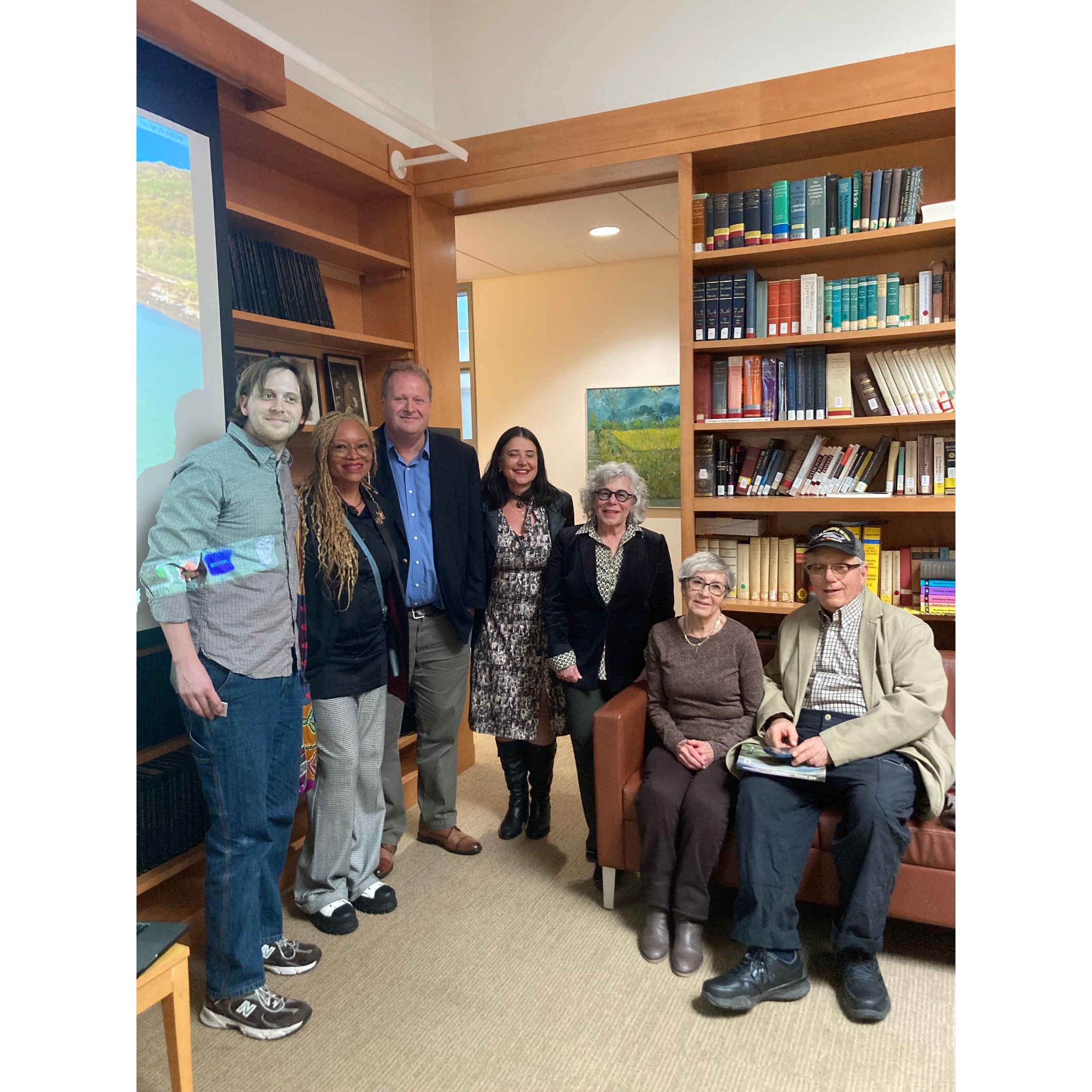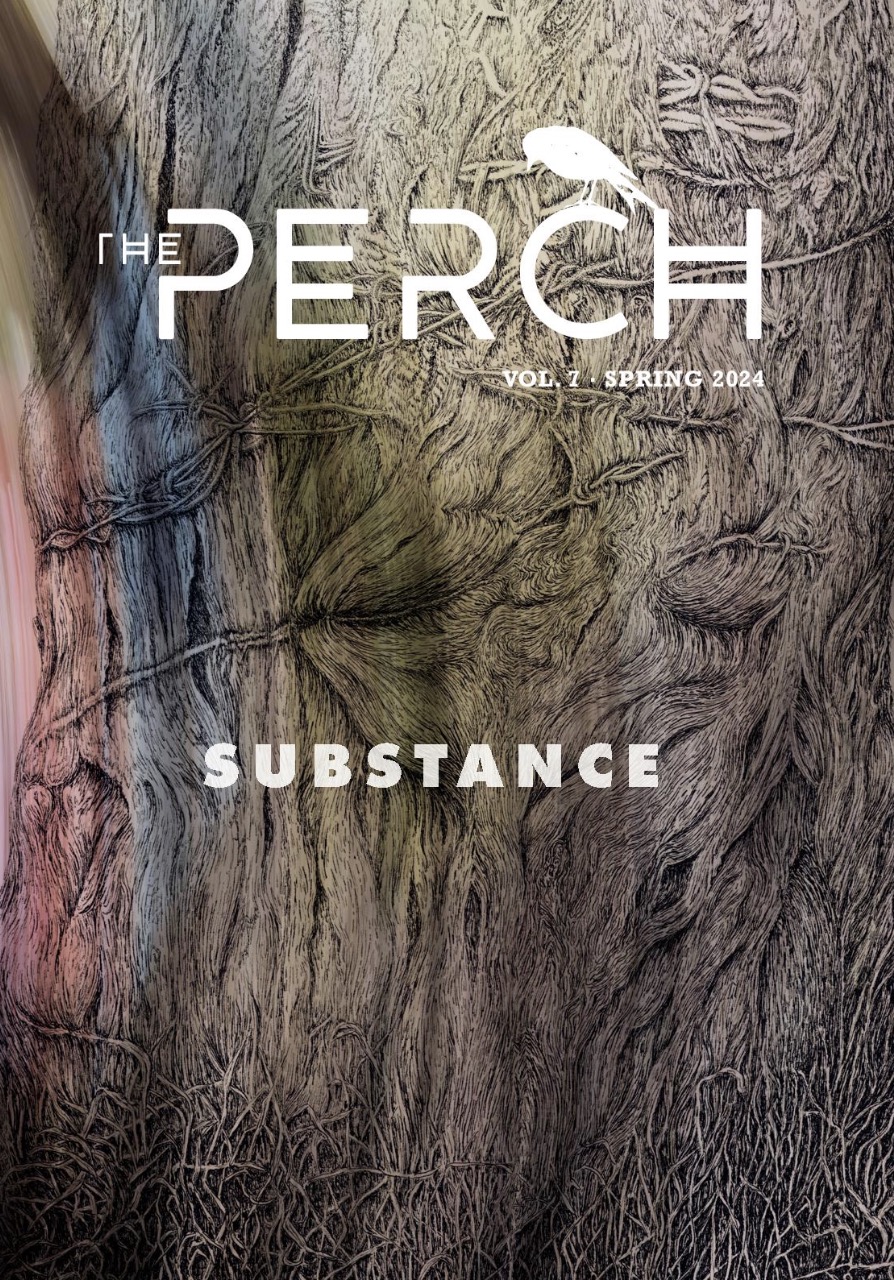
c/o Charles Barber
On Thursday, April 25, the College of Letters hosted a release reception for the publication of a new volume of The Perch, a creative arts journal with a mental health theme edited and organized by Writer-in-Residence and Associate Professor of the Practice in Letters Charles Barber. Co-published by the College of Letters and the Yale Program for Recovery and Community Health (PRCH), the journal’s seventh volume is entitled “Substance,” and tackles themes of substance use and recovery.
“It’s an intense issue,” Barber said. “There are people writing about loss…but I think, for the most part, the contributors have certainly said to me that they found it very cathartic and helpful to write about and express these things.”
Medical sociologist Michael Rowe founded The Perch in 2013, hoping to publish works of artistic inquiry into psychological issues. Much of the material found in The Perch is outsider art—that is, work not done by professional artists and writers, but rather by patients, family members, and clinicians. These writers include University students and Middletown community members.
“I like how accessible The Perch is,” Associate Editor of “Substance” Rachel Weir ’24 said. “Especially to people who are not necessarily academics.”
For the last two issues of The Perch, the College of Letters has provided financial support both for the journal’s production and to support two summer student interns, who assist with the journal’s creation process. This year, those interns are Weir and Ella Tierney ’23. The theme of the previous volume of The Perch, published in Fall 2021, was the COVID-19 pandemic and its psychiatric and psychological consequences.

c/o The Perch
The Perch’s Spring 2024 Substance issue contains a range of original pieces of poetry, creative nonfiction, fiction, and visual art, all concerning the experience of using substances and offering wider contexts for substance use. These works deal with the use of drugs, maintaining sobriety, trauma, and hope. It takes the reader on a journey from incarceration to health care, including harm reduction, medication-assisted treatment, individual therapy, recovery groups, spiritual healing, acupuncture, safe consumption sites, needle exchanges, and more.
“The whole crux of it was…to [create] open and honest dialogue, without moral judgment,” Barber said. “And [with] a true variety of perspectives. So there are contributions, you know, from all over the world.”
The journal is arranged in three sections as the “Before,” “During,” and “After” of drug use, stages in every addiction recovery story. Each narrative achieves a full arc, beginning with the life circumstances that propelled people into addiction and ending in the effects of recovery. Too often, according to The Perch’s introduction, literature concerning the topic of substance use solely focuses on isolated elements, and not the entire journey of recovery. The Perch attempts to rectify this, and to publish not a single element of the recovery process, but the whole painful process, through the trials and tribulations of letting go and embracing sobriety.
“It really is the story of addiction from start to finish,” Weir said. “We wanted to show it in full.”
When brainstorming a theme for the Spring 2024 issue, Barber states that everyone naturally agreed on the theme of substance use, given its current prevalence in the news. Within the younger population, opioid and other drug overdoses have spiked dramatically—drug use is becoming both more common and more deadly among younger populations. Addressing the psychological implications was important to the editorial staff of The Perch. Weir also noted the significance of the subject, especially after the pandemic.
“We started looking for submissions last year,” Weir said. “[We] chose it because, after COVID, it was much more of a present and rampant issue…. Our generation looks at substance abuse and mental use in a kinder way than previous generations have.”
Barber selected work profound for its honesty and expression, rather than literary polish. He also made sure to maintain each writer’s and artist’s voice and intention when undertaking the editing process.
“I was looking for a feel, and that honestly declares itself pretty quickly,” Barber said. “Very few of the pieces are heavily edited.”
Nakial Cross ’25 wrote for The Perch, thinking of recovery from the position of aspiring physician. Cross sees an intersection between medicine and literature as a way of communicating and understanding the different perspectives that may arise when treating patients; experience diversity and diversity of thought in medicine are especially important to Cross.
“I heard about The Perch through [Professor] Barber,” Cross said. “It’s super important to have mentors that aren’t just in the sciences and the natural sciences, and [to achieve a] different understanding of the work you want to do as a physician.”
Cross’s family history of substance abuse, tied to the military, was also a source of inspiration to contribute to the journal. He explores the struggle of coping with trauma and generational trauma in his work “You’re Scars,” contemplating the scars left behind from substance use.
“You’ve got a lot of scars / Daddy put a cigarette out on your arm, / you fell a couple times and were wounded and some sores scar / some are visible most not / scarred, scarred, you smoke your fears / away,” Cross’s poem reads.
Particular to this issue is the inclusion of three scholarly reflections: one concerning pica, a mental health disorder where sufferers swallow non-food items, and two other works on substance disorder treatments and voices from clients on addiction. These pieces are typically not published in literary journals, and provide a clinical view of substance use alongside more personal pieces.
With all the work compiled and the design for the journal complete, The Perch’s official release drew a large crowd both on Zoom and in-person in the College of Letters Library in Boger Hall. The launch gathered an audience from out-of-state, community members and University members alike.
“It was awesome to connect with people from all over,” Cross said. “People who came from New York, students, and parents. It was great.”
In attendance was Connecticut Commissioner for the Department of Mental Health and Addiction Services Nancy Navaretta, and Yale Chair of Psychiatry John Krystal, MD. On Zoom was Emily Ann Barr, author of the essay “Encyclopedia Brown: A Story for My Brother, Philip Seymour Hoffman,” the sister of the well-known actor who passed away due to combined drug intoxication. She read aloud a poem she had written about his passing, entitled “Paparazzi,” in which she recounts the horrors she experienced after Hoffman’s death.
“We had a lot of contributors speaking, and they ranged across genres,” Barber said. “So we had a poet, a scholarly piece read aloud, we had fiction and nonfiction, and a slideshow with artwork going on.”
The Perch’s online viewership currently stands at 5,000 views garnered within the past week, and continues to grow. The publication of the individual stories of each artists’ recovery journey and its public reception will hopefully construct a more understanding view of recovery and addiction.
“I think, again, our intention was to create open dialogue,” Barber said. “And that seems to be the spirit in which it’s being received.”
Carolyn Neugarten can be reached at cneugarten@wesleyan.edu.